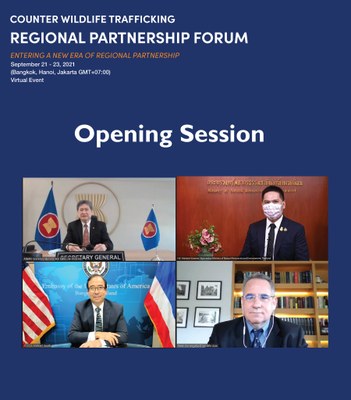New Partners’ Group to Build Upon U.S., Thai Success to Counter Wildlife Trafficking
The Counter Wildlife Trafficking (CWT) Development Partners Coordination Platform for Asia was one of the results of the virtual Counter Wildlife Trafficking Partnership Forum from September 21-23, 2021, co-hosted by the United States, and Thailand’s Department of National Parks, Wildlife and Plant Conservation (DNP).
U.S. Embassy Chargé d’Affaires Michael Heath gave remarks at the Forum, the capstone of the USAID Wildlife Asia regional program: “President Biden is prioritizing the environmental agenda at this crucial time when the world is facing a climate crisis,” he said. “As part of our environmental initiatives, our USAID Wildlife Asia program worked with national and regional bodies in Southeast Asia to end, neutralize and disrupt transnational environmental crime. We are honored to facilitate this program with our long-standing partners, the ASEAN Secretariat and the Government of Thailand’s Department of National Parks, Wildlife Plant and Conservation, as we increase our counter wildlife trafficking efforts,” he continued.
“Following the Chiang Mai Statement of ASEAN ministers responsible for Convention on International Trade and Endangered Species of Wild Fauna and Flora (CITES), and wildlife enforcement on illegal wildlife trade in 2019, ASEAN has been moving forward to promote dialogue on issues related to global and regional wildlife trade policies, demand reduction and enhanced law enforcement,” said ASEAN Secretary General Lim Jock Hoi.
Minister Varawut Silpa-archa, Thailand’s Ministry of Natural Resources and Environment, said: “I sincerely believe that our endeavor will further our movement towards the achievement of ending the illegal trade in wildlife, and will eventually contribute to the betterment of our natural resources and environment. I wish that our virtual forum today will advance our coordinated action towards a more sustainable and resilient future.”
Since 2016, USAID Wildlife Asia has been deterring wildlife crime and protecting endangered species from extinction by partnering with Southeast Asia countries to strengthen counter wildlife trafficking laws, arrest and prosecute criminals, and reduce demand for wildlife products through game-changing consumer campaigns. The program has also helped catalyze more effective and impactful collaboration and regional integration of counter wildlife trafficking efforts.
The U.S. Embassy announced plans to continue these efforts through a new program, USAID Reducing Demand for Wildlife, which will build on the successes of USAID Wildlife Asia. This includes efforts to implement the regional Plan of Action (POA) for the ASEAN Cooperation on CITES and Wildlife Enforcement (2021-2025) developed with USAID Wildlife Asia support. The program will also work to advance the outcomes of the Partnership Forum including strengthening partner coordination and cooperation in the region.
The forum was organized in collaboration with WWF, the Asian Development Bank, World Bank Global Wildlife Program, Global Environment Facility, and United Nations Development Programme.
From 2016 to 2021, USAID’s $24.5 million Wildlife Asia program also:
- Pioneered evidence-based and targeted demand reduction campaigns, leading to a 50% drop in proportion of people intending to buy wildlife products in Thailand, Vietnam, and China;
- Advanced 10 progressive laws and policies towards counter wildlife trafficking that introduced dramatic increases in fines and sentencing for wildlife crime;
- Mainstreamed the collaborative approach among law enforcement agencies to countering transnational organized wildlife crime, with officials from 137 law enforcement agencies from 24 countries trained across Asia and Africa; and
- Leveraged $19.6 million in public-private partnership initiatives.


